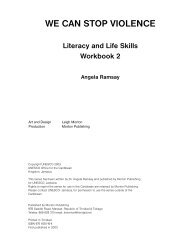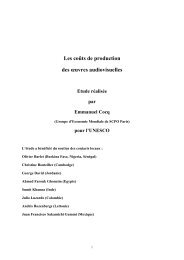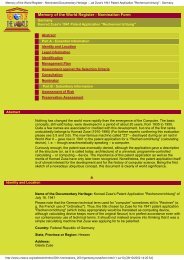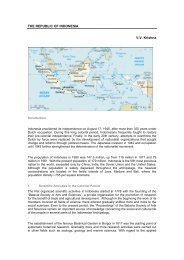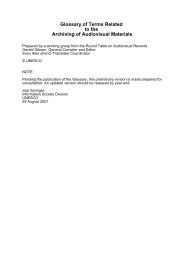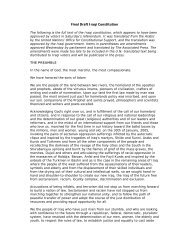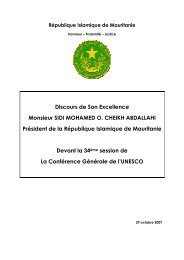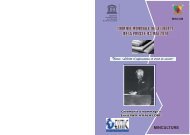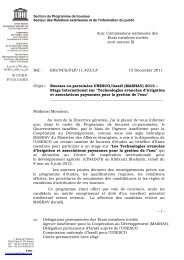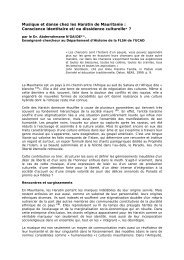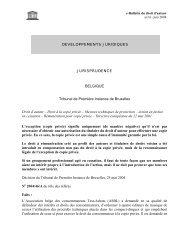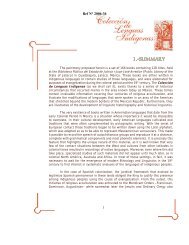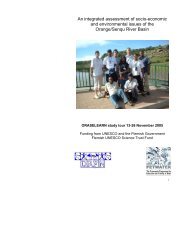Accepted Papers - 3.pdf - UNESCO
Accepted Papers - 3.pdf - UNESCO
Accepted Papers - 3.pdf - UNESCO
You also want an ePaper? Increase the reach of your titles
YUMPU automatically turns print PDFs into web optimized ePapers that Google loves.
National Seminar on Rainwater Harvesting and Water Management 11-12 Nov. 2006, Nagpur<br />
77. Rain Water Harvesting to Improve Socio-economic conditions<br />
in Hilly Areas of Maharashtra<br />
INTRODUCTION<br />
The importance of water to the sustainable<br />
habitat is enormous. It can be best emphasized by<br />
acknowledging the fact that it is the prime mover<br />
for the existence of living being on our planet Earth.<br />
Realizing this importance, a large-scale<br />
development of surface water resources through<br />
major and minor projects has been taken up by the<br />
government to ensure water supply for drinking as<br />
well as for irrigation. The government has accorded<br />
highest priority to rural drinking water supply as a<br />
part of policy framework for ensuring universal<br />
access to all and to achieve the goal of reaching the<br />
unreached. For effective implementation of this<br />
policy, a number of hand pumps and water supply<br />
schemes are installed in villages, lacking water<br />
source. Despite of all these initiatives, the water<br />
supply system fails to sustain, thereby, leaving the<br />
inhabitants to reel under acute water shortage. Their<br />
life is full of poverty, deprivation and other miseries.<br />
*Sourabh Gupta<br />
Abstrct<br />
Poverty, disease, low agriculture productivity and poor moral, exacerbated by lack of<br />
water, are the common features of the hilly areas, which lead to hardship, deprivation for the<br />
habitants. A large part of hilly areas<br />
are generally found to be lacking suitable land for cultivation and adequate irrigation facilities,<br />
thus remain denied of high cropping intensity. Although, at places they experience heavy rains<br />
during monsoon but rainwater quickly runs away due to steep gradient & poor infiltration of<br />
the under lying rock. However, the quick replenishment of wells has normally been observed<br />
with the onset of monsoon but they start depleting quickly soon after the monsoon season, as the<br />
significant movement of water occurs from higher level to lower level due to high water table<br />
gradient which is well evident from the ground water monitoring structures such as dug wells<br />
and bore wells. As a result, the acute water shortage becomes imminent during summer.<br />
The diverse hydrogeological and rainfall conditions of these areas necessitate developing<br />
varied measures to tackle the water scarcity situation. Site specific Rainwater harvesting schemes<br />
like Tanks/ponds, Gully plugging, Contour bunding, bench terracing, Sub surface dams meant<br />
for water and soil conservation have quite successfully produced the desired results.<br />
There are many villages, which have remained either<br />
with scarce water supply or without any source of<br />
water. Some of these villages are categorized as<br />
problem villages as the source of potable water is<br />
beyond 1.0 kilometre.. The women have to walk a<br />
distance of about 1.0 kms to reach up to the source<br />
of water. The virtually dry and dead water resources<br />
of hilly areas have led to acute water scarcity,<br />
affecting the socio -economic conditions of these<br />
villages. Such water scarcity conditions leads to<br />
poor agriculture productivity and thereby poor<br />
economic condition, which inevitably compels the<br />
villagers to migrate to cities in search of livelihood.<br />
Area Under Reference<br />
The hilly areas of Maharashtra referred in the<br />
context of above problem are (i) Western margin of<br />
Maharashtra Deccan plateau, which is bordered by<br />
elevated Sahyadri ranges (elevation from 600 to<br />
1600m.amsl), extending from north to south. The<br />
*Scientist “D”, CGWB, MSU, 247/11, Deccan College Road, Yerwada, Pune - 6<br />
E-mail : archsaugupta@yahoo.com<br />
429



